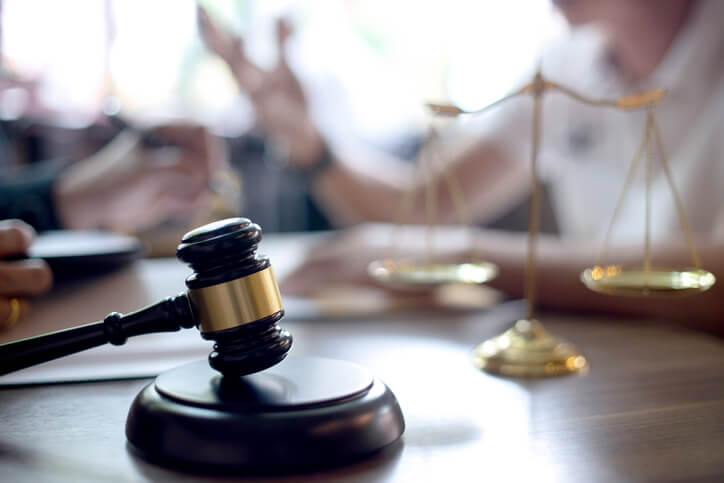Are you headed for an arraignment hearing but you’re not sure what to expect?
Is it like a trial, or will you just meet the judge? Is that where you plead “not guilty,” or is a court arraignment where you only hear the criminal charges against you?
There are a lot of misconceptions about arraignment hearings floating around the internet, so our desire today is to help you understand exactly what an arraignment hearing is, how to prepare for yours, and what happens when you’re there.

What Is An Arraignment Hearing?
An arraignment hearing is your first court event after receiving a misdemeanor or criminal charge. Typically, the arraignment process will take place within the first day or two after you’ve been arrested or charged.
During an arraignment, you will hear the charges being brought against you, as well as the potential penalties you could receive. You will also be informed of your rights and your bail will be set.
Most importantly, the arraignment is where you make your “not guilty” plea.
Let’s look at each of these steps in more detail.
When Does The Arraignment Happen?
The sixth amendment to the United States Constitution guarantees your right to a speedy trial and your right to be informed of the charges being brought against you.
In order to keep the sixth amendment, your arraignment will happen either the day you were arrested or the next day. During the court arraignment, you will hear what the charges against you are and the judge will usually set a day for your trial.
What Happens During An Arraignment
When the time of your arraignment comes, you will be directed by a court officer to stand at a microphone or place designated for the defendant—at your arraignment, you are the defendant.
You can expect the following four steps to occur, but the order will depend on the judge.
1. Informing The Defendant Of Their Rights
You will be informed of your rights as the defendant. These include your right to a speedy trial and your right to an attorney. These rights are given to you by the sixth amendment.
If you are unable to afford an attorney, you can request a public defender. The judge will appoint a lawyer to defend you. You usually meet your court-appointed attorney once the arraignment ends.
2. Telling The Defendant What The Charges Are
Your charges will be read aloud, and if your charges are serious, the judge may also inform you of what the potential penalties are should you be found guilty.
3. Plea Entering
Once you’ve heard the charges, you will be asked to enter your plea. Either a court clerk will enter a “not guilty” plea for you, or the judge may ask you how you want to plead.
You may plead in three ways:
- You may plead “not guilty,” which means that you deny your charges and that you want a trial.
- You may plead “guilty,” which means that you validate the charges against you.
- You may plead “no contest,” which basically means that you are not going to contest the charges but at the same time you are not admitting guilt.
Typically, you should always plead “not guilty.” This ensures that your case goes to trial and that your attorney is able to develop a case to defend you.
There are exceptions to this though — in situations where it is actually beneficial for you to plead “guilty” or “no contest.” Doing so can be risky though, so it is crucial that you speak with a defense attorney before considering a “guilty” or “no contest” plea.
4. Deciding The Conditions Of Release
After entering your plea, the judge will determine the conditions of your release. During this step in the arraignment process, the judge will weigh a number of factors, including your likeliness to return to court, your criminal history, and the severity of the charges.
If bail is set, you will be held in custody until the bail has been paid with either cash or certified check.
The judge will also determine the conditions of your release should you be able to pay bail. These could include forfeiting your passport, forbidding you to drink, and orders to avoid a certain person or place.
Never break the conditions of your release. Doing so would severely damage your chances of mounting a successful defense.
;
How To Prepare For Your Arraignment?
Now that you understand what happens at an arraignment hearing, let’s consider how you can prepare for yours.
Get An Attorney
The most important thing you can do to prepare for your arraignment is to find an expert defense attorney to represent you.
If you have an arraignment coming up, speak with a criminal defense attorney as soon as you can. They can help you determine what plea you should enter.
Don’t Share The Details Of Your Case
Don’t confide the details of the case with anyone except your attorney. This is especially important on the day of your arraignment. Do not tell the judge or any court staff anything about your case. Once you have an attorney, they can advise you on what information is safe to share with friends or family.
Get A Criminal Defense Attorney
Here at Leyba Defense, expert criminal defense attorney, Matthew Leyba, has a proven track record of successfully resolved criminal cases. He understands how daunting it can be to walk into an arraignment without legal counsel and is standing by to help you prepare for your meeting with the judge.
Don’t risk entering the wrong plea or sharing too much information — contact Leyba Defense today.
